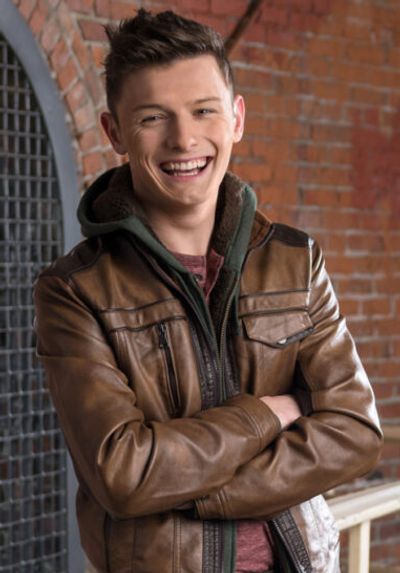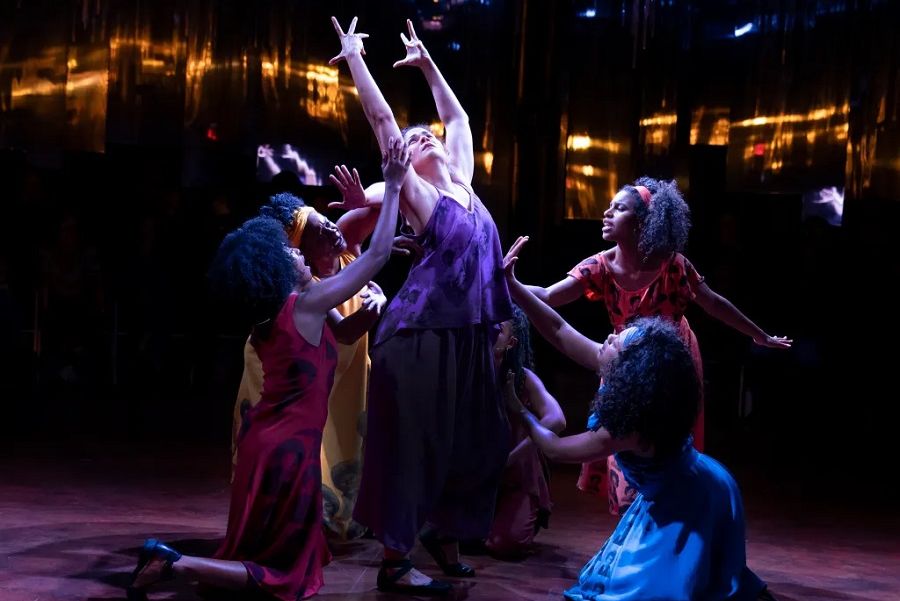There’s no denying the fact that we are currently experiencing a Deaf renaissance in the theatre. Quite possibly precipitated by CODA’s history-making wins at the Academy Awards in March, where the underdog film shattered expectations by swooping in and walking away with the top prize for Best Picture, Deaf people and stories have never been more visible on the boards as they are this year.
In New York City alone, multiple Deaf actors can be seen this summer playing major roles in high-profile mainstream productions as varied as the Public’s Richard III in Central Park and For Colored Girls… on Broadway, as well as the Arlekin Players Theatre’s The Cherry Orchard at the Baryshnikov Arts Center. Near Baltimore, the Olney Theatre is populating River City with a large and diverse group of Deaf denizens for their production of The Music Man, led by James Caverly in the titular role who causes trouble while being Deaf with a capital D. Meanwhile, the national Broadway tour of To Kill a Mockingbird is currently playing cities around the country with Deaf actor Anthony Natale in the role of Link Deas, out-of-the-box casting that was first seen on Broadway when Russell Harvard stepped into the role as a replacement at the Shubert.
What is striking is that exactly none of these roles were originally written for Deaf actors, allowing each of these classic stories and characters to be viewed through a fresh new lens with brand new dynamics and layers. Indeed, this sort of non-traditional casting has rarely been seen on mainstream stages, especially to such an extent, which means that there has never been a better time to be a Deaf actor than right now.
While the visibility of Deaf performers has exploded, opportunities for Deaf artists in other creative roles in this industry are still few and far in between. Stories about Deaf people on the stage have long been a source of fascination ever since Mark Medoff’s seminal Children of a Lesser God premiered over forty years ago and, still today, remains the most popular and well-known play about Deaf people. The 2018 Broadway revival, however, did nothing but expose the deep flaws of the work, which could no longer – especially in the charged atmosphere of current times – be overlooked in favor of overt sentimentality. The failure of that production to find a modern new audience was yet another reminder that, instead of simply rehashing old mainstream chestnuts, we need to provide greater support to Deaf creators themselves.
Over the years, the mainstream theatre industry has been glacially slow to allow actual Deaf people to be directly involved in the creation of their own stories, rendering them little more than puppets on the stage while others pull the strings. Even Deaf West, currently the leading theatre in the nation exclusively dedicated to Deaf artistry, saw both of its Broadway outings – Big River in 2003 and 2016’s Spring Awakening – led by hearing directors. Recent Off Broadway shows such as Tribes and I Was Most Alive With You took stories directly from the community and filtered them through the secondhand lens of hearing writers and directors.
In the current era of heightened accountability and emphasis on the importance of authentic representation, it is somewhat disconcerting that we do not yet have Deaf writers or directors working regularly on a professional level telling firsthand stories from our culture and community, especially considering the incredible value already placed on working with Deaf actors.
Fortunately, though, it’s looking like things are finally changing and Deaf people are slowly starting to emerge on the other side of the creative table, long an impenetrable bastion to those from the community. Olney’s The Music Man, for instance, is being co-directed by Deaf actress Sandra Mae Frank, who played Wendla in Deaf West’s Broadway revival of Spring Awakening. Frank’s co-star from that production, Joshua Castille, is currently co-directing a production of The Little Mermaid at Music Theater Works near Chicago, which is even more striking considering that this production of the musical contains no Deaf actors or American Sign Language.

Castille, when originally offered the job by artistic director Kyle Dougan, was told that he did not need to bring his own identity or language to the story, and found that incredibly freeing, because, as a performer, he said he tends to find himself chained to his Deafness. Instead, they cut the bonds and looked at him “as a storyteller, and not just a storyteller of Deaf narratives,” seeing “an opportunity to prove that Deaf people can direct and guide musicals about hearing people.” Artistic freedom aside, Castille also saw that adding layers of Deafness and ASL would be detrimental to the story itself, and opted to stay away from complicated dynamics their introduction would create.
“I found myself,” he said, “seeing the whole signing narrative weakening the stakes of the show. Ariel’s voice is taken away. If she knew sign language, then she could just teach Eric signs. If Ursula was Deaf, then it became the angry Deaf woman taking people’s voice…I wasn’t a fan of that narrative. If one of the mer-sisters signed, then Ariel just didn’t learn for her sister. Gross. So I just stayed away from that.”
While it’s relatively groundbreaking to see a Deaf person helping to lead a musical who got the job based solely on his own initiative and talent, it doesn’t need to be the exception. Hopefully, the current Deaf renaissance will help more artists like Castille finally break more cleanly out of the box that their identity has so far confined them in and branch out to further opportunities that aren’t necessarily defined by Deafness.
Making more space in this industry for our own authentic voices was a large reason why, three years ago, I personally decided to go back to school and get my Master’s in playwriting from Hunter College, this month becoming the very first Deaf person to graduate from that program. My Deaf culture adaptation of Sophocles’s Philoctetes, which I wrote during my time at Hunter and which includes layers about disability politics and cultural appropriation, has already been selected for development this summer by the Orchard Project.
My voice as a Deaf theatre artist is not limited to just writing. During the onset of the pandemic, Deaf Broadway was founded in my living room on March 22, 2020 – Stephen Sondheim’s 90th birthday – in order to provide better visual language access to theatre for the Deaf community. After several virtual performances, our first live presentation was a production I directed of Into the Woods entirely in ASL by Deaf actors at Lincoln Center last September. It was such a resounding smash that we were asked to return this summer with the same approach for Sweeney Todd. Somewhat inadvertently, Deaf Broadway has now become the go-to source for ASL versions of Sondheim’s work, for which we were fortunate to receive his personal blessing before he passed last November. The demand we have seen thus far only proves what an incredible need there is for direct interpretations of classic works by Deaf artists through the authentic lens only we can provide.

Similar initiatives are blossoming across the country, creating a pipeline of sorts to mainstream stages for Deaf theatre artists. Leading the charge is Seattle’s Deaf Spotlight, the mission of which is “to inspire and showcase Deaf culture and Sign Languages through the arts.” To do this, they collaborate with peer Deaf theatres to offer professional development workshops and host a biennial short play festival, all of which help lead them closer to their goal of creating “a bigger pool of talent” within the community. This year, they will be moving into a brand-new space and hosting their very first Art Summit, a virtual professional development space “where Deaf, DeafBlind, DeafDisabled, and Hard of Hearing artists can network and learn more about the business side.”
Like Deaf Spotlight, the Washington DC-based Visionaries of the Creative Arts (VOCA), champions the development of new and original artistic work by Deaf artists, but with an emphasis on BIPOC voices, helping them to “collectively create, collaborate, and showcase their culturally distinct work through various forms of creative arts.” Last December at the Atlas Performing Arts Center, they presented the original stage show “…ism”, a collective of stories from and by BIPOC Deaf and hard of hearing individuals that was conceived and created by VOCA co-founder Michelle Banks. Currently, they have plans to tour the show and hope to eventually bring it to New York City.
Also employing the stage to enrich the larger community is Deaf Austin Theatre (DAT) in Texas, which aims “to create memorable theatrical experiences through American Sign Language that enrich and mesmerize,” as well as “a world where theatre is accessible to everyone.” Just before the pandemic, they collaborated with Ground Floor Theatre to produce a mixed Deaf and hearing ASL version of the Broadway musical Next to Normal. Next up is a production of Moises Kaufman’s The Laramie Project, which will be directed by Deaf filmmaker Jules Dameron. The idea for this latter production came from DAT’s Deaf artistic director Dr. Brian Cheslik’s work as a teacher when he noticed that his Deaf students found it challenging to relate to the English text, “especially if their native language is ASL.” With The Laramie Project, Dr. Cheslik intends to combine his training as a teacher with his passion for the stage and “create a full curriculum resource for the play that is designed for Deaf and hard of hearing students,” containing “lesson plans for English, Art, Theatre, Government, and US History,” expanding the reach and potential of the play well past the footlights.
The great thing about the Deaf renaissance we’re in the midst of is that its benefits are relatively widespread, uplifting everyone and allowing more people to see and understand the true wealth that lies within our culture and identity. And the momentum can become self-reinforcing. According to Deaf Spotlight, “These emerging and experienced artists will bring in new people, new energy, and new money” to theatres and, subsequently, communities. As we slowly come out of a global pandemic and several cultural reckonings, there is no better time than the present moment to breathe new and exciting life into this industry and the world, which includes expanding the breadth of what Deaf people can do.
Garrett Zuercher, a veteran stage and screen performer, is also one of the founders of Deaf Broadway, a collective of Deaf actors who make theatrical productions visually accessible in American Sign Language.


